\(\left(3x^4-8x^3-5+8x-10x^2\right):\left(-2x^2+1+3x\right)\)
Hãy nhập câu hỏi của bạn vào đây, nếu là tài khoản VIP, bạn sẽ được ưu tiên trả lời.




a) \(\left(x^4+2x^3+10x-25\right):\left(x^2+5\right)\)
\(=\left[\left(2x^3+10x\right)+\left(x^4-25\right)\right]:\left(x^2+5\right)\)
\(=\left[2x\left(x^2+5\right)+\left(x^2-5\right)\left(x^2+5\right)\right]:\left(x^2+5\right)\)
\(=\left(x^2+5\right)\left(x^2+2x-5\right):\left(x^2+5\right)\)
\(=x^2+2x-5\)

\(\frac{3x^4-8x^3-10x^2+8x-5}{3x^2-2x+1}\)
\(=\frac{x^2\left(3x^2-2x+1\right)-2x\left(3x^2-2x+1\right)-5\left(3x^2-2x+1\right)}{3x^2-2x+1}\)
\(=\frac{\left(3x^2-2x+1\right)\cdot\left(x^2-2x-5\right)}{3x^2-2x+1}\)
\(=x^2-2x-5\)
\(\frac{2x^3-9x^2+19x-15}{x^2-3x+5}\)
\(=\frac{2x\left(x^2-3x+5\right)-3\left(x^2-3x+5\right)}{x^2-3x+5}\)
\(=\frac{\left(x^2-3x+5\right)\left(2x-3\right)}{x^2-3x+5}\)
\(=2x-3\)

a/ \(\left(2x-3\right)\left(3x-4\right)\left(5x+2\right)>0\)
\(\Rightarrow\left[{}\begin{matrix}-\frac{2}{3}< x< \frac{4}{3}\\x>\frac{3}{2}\end{matrix}\right.\)
b/ \(\Leftrightarrow24x^2-10x-25< 0\)
\(\Rightarrow-\frac{5}{6}< x< \frac{5}{4}\)
c/ \(\frac{4x\left(3x+2\right)}{2x+5}>0\Rightarrow\left[{}\begin{matrix}-\frac{5}{2}< x< -\frac{2}{3}\\x>0\end{matrix}\right.\)
d/ \(\Leftrightarrow\frac{3x+2}{2x-5}-\frac{2x-5}{3x+2}\ge0\)
\(\Leftrightarrow\frac{\left(3x+2\right)^2-\left(2x-5\right)^2}{\left(2x-5\right)\left(3x+2\right)}\ge0\)
\(\Leftrightarrow\frac{\left(5x-2\right)\left(x+7\right)}{\left(2x-5\right)\left(3x+2\right)}\ge0\Rightarrow\left[{}\begin{matrix}x\le-7\\-\frac{2}{3}< x\le\frac{2}{5}\\x>\frac{5}{2}\end{matrix}\right.\)

f. 5 – (x – 6) = 4(3 – 2x)
<=>5-x+6=12-8x
<=>7x=1
<=>x=\(\dfrac{1}{7}\)
g. 7 – (2x + 4) = – (x + 4)
<=>7-2x-4=-x-4
<=>x=7
h. 2x(x+2)\(^2\)−8x\(^2\)=2(x−2)(x\(^2\)+2x+4)
<=>\(2x\left(x^2+4x+4\right)-8x^2=2\left(x^3-8\right)\)
<=>\(2x^3+8x^2+8x-8x^2=2\left(x^3-8\right)\)
<=>\(2x^3+8x=2x^3-16\)
<=>\(8x=-16\)
<=>\(x=-2\)
i. (x−2\(^3\))+(3x−1)(3x+1)=(x+1)\(^3\)
<=>\(x-8+9x^2-1=x^3+3x^2+3x+1\)
<=>\(6x^2-2x-10=0\)
<=>\(3x^2-x-5=0\)
<=>\(\left[{}\begin{matrix}x=\dfrac{1+\sqrt{61}}{6}\\x=\dfrac{1-\sqrt{61}}{6}\end{matrix}\right.\)
k. (x + 1)(2x – 3) = (2x – 1)(x + 5)
<=>\(2x^2-x-3=2x^2+9x-5\)
<=>10x=2
<=>\(x=\dfrac{1}{5}\)
f. 5 – (x – 6) = 4(3 – 2x)
<=>5-x+6=12-8x
<=>7x=1
<=>x=\(\dfrac{1}{7}\)
g. 7 – (2x + 4) = – (x + 4)
<=>7-2x-4=-x-4
<=>x=7
h. \(2x\left(x+2\right)^2-8x^2=2\left(x-2\right)\left(x^2+2x+4\right)\)
<=>\(2x\left(x^2+4x+4\right)-8x^2=2\left(x^3-8\right)\)
<=>\(2x^3+8x^2+8x-8x^2=2x^3-16\)
<=>\(8x=-16\)
<=>x=-2
i.\(\left(x-2\right)^3+\left(3x-1\right)\left(3x+1\right)=\left(x+1\right)^3\)
<=>\(x^3-6x^2+12x+8+9x^2-1=x^3+3x^2+3x+1\)
<=>\(9x+6=0\)
<=>x=\(\dfrac{-2}{3}\)
k. (x + 1)(2x – 3) = (2x – 1)(x + 5)
<=>\(2x^2-x-3=2x^2+9x-5\)
<=>10x=2
<=>x=\(\dfrac{1}{5}\)